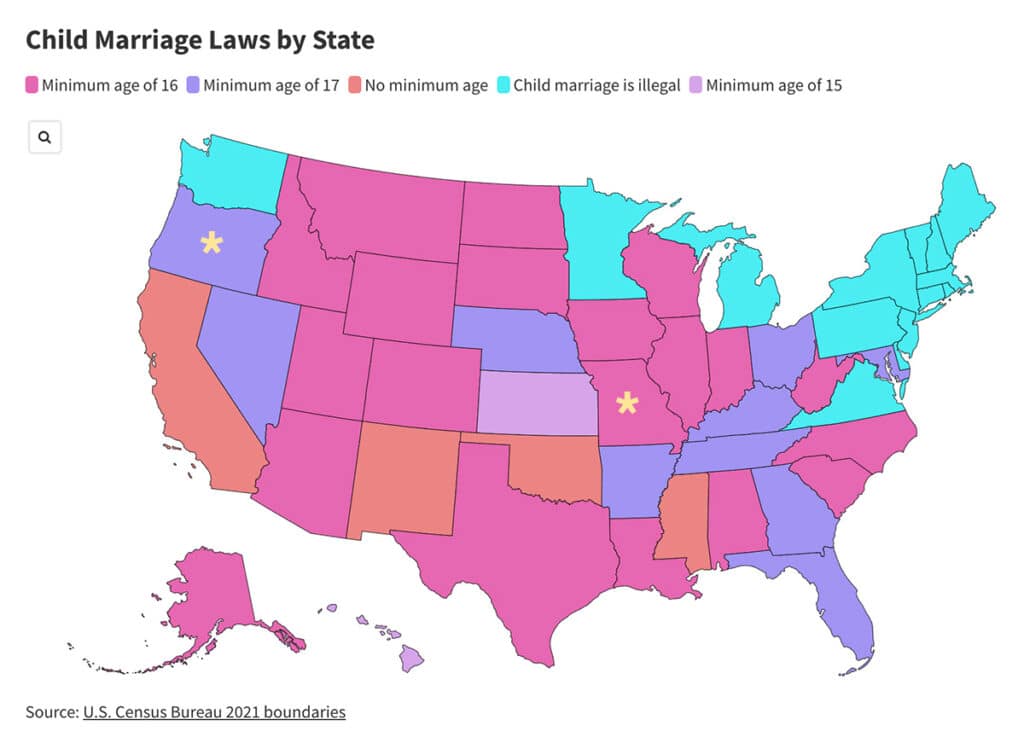Volcanoes are erupting in The Philippines, but on-fire Australia received some welcome rain. The Iran war cries have been called off and The Donald’s military powers are about to be hamstrung by the Senate. Meanwhile, his impeachment trial is starting, and we’re all on Twitter for a front-row seat.
What Could Go Right? The US Says “I Don’t” to Child Marriage
A reform movement to end child marriage is gaining momentum across the country.
This is our weekly newsletter, What Could Go Right? Sign up here to receive it in your inbox every Thursday at 5am ET. You can read past issues here.
The US Says “I Don’t” to Child Marriage
When I say that child marriage is still legal in most American states, do you ask whether that means a minor marrying an adult, or two star-crossed 17-year-olds marrying each other?
It means both, and that’s the rub. Data is hard to come by, but the group Unchained at Last, which advocates to end child and forced marriage in the United States, estimates that between 2000 and 2015, of the over 200,000 minors who got married, only 14 percent were wed to other minors.
So leaving the Romeos and Juliets of America to fulfill their matrimonial dreams also leaves the door open for abuse. While “child marriage” calls to mind very young girls marrying much older men in religious cults—which does happen, although it is rare—child marriage also results in the legal trafficking of American and foreign girls. The American ones are married off to men seeking a US visa, and the foreign ones are imported from abroad to marry American men, says Unchained at Last.

There is good news, though!
There has been a legislative sea change around this issue since 2016 or so, when a national reform movement began to sprout. In 2018, Delaware became the first US state to prohibit anyone under the age of 18 from marrying. New Jersey quickly followed suit that same year. Since then, 12 other states—in addition to the US Virgin Islands, American Samoa, and Puerto Rico—have, too. Maine was the latest to join the bandwagon, earlier this month.
The count will soon rise to 16 if governors in Oregon and Missouri sign bills that state legislatures passed in April and May, respectively.
With the exception of California, New Mexico, Oklahoma, and Mississippi, where there is no minimum age to get married, in most states you must be 16 or 17 years old, and parental consent is required—all new conditions passed after 2016.

Advocates are not satisfied by parental consent laws, however, since children can be coerced into marriage by their parents. Even marriages happily entered into by all parties can have wrinkles, if those parties are underage. Marrying under 18 makes it difficult to initiate divorce proceedings, for example, because a minor isn’t legally old enough to represent his or her own interests without an appointed guardian. And we heard at least one interesting story from someone on social media, who made the case for why raising the age floor to 18 makes things easier on parents, too.

My colleague Molly, who single-handedly manages all of The Progress Network‘s social media accounts, made a video about this issue that racked up over a million views on Instagram. In the comments, thousands despaired that it had taken so long to address child marriage in the US.
Yes, it’s depressing, and movement forward is a slog. Lawmakers in South Carolina have tried, and failed, to pass bills banning child marriage three times since 2020.
And yet . . .
Nothing changes for a long time, and then everything can change at once. In the fall of 2024, for instance, I wrote about the hodgepodge coverage in the US for victims of revenge porn. At that time, less than half of states had taken action to criminalize the nonconsensual sharing of intimate imagery or videos—progress, but not enough of it. Now, just eight months later, President Donald Trump has signed the Take It Down Act, which creates federal penalties for sharing revenge porn, including AI-generated deepfakes, and requires platforms to remove it within 48 hours of a victim’s request. (More on that in the links section below.)
As long as energy around an issue exists, so does the potential for change. Even South Carolina’s three failures to pass a ban is an indication that the energy to succeed is still present. In fact, a fourth attempt there is already in the works.
P.S. There are some green shoots of progress happening worldwide as well. Pakistan’s capital city, Islamabad, banned child marriage last week. Since the decision required both houses of Pakistan’s legislature, it might be the start of a domino effect throughout the country’s provinces.
By the Numbers
16%: Uganda’s poverty rate in 2024, down from 20 percent in 2020 and a whopping 56 percent in the early 90s.
122K: The number of jobs in the US at clean energy factories. Nearly three-quarters of them are located in red states.
542: The number of manmade structures built to block rivers, such as dams, that were removed by European countries in 2024, a record. Four countries removed a river barrier for the very first time.
23: The number of countries globally that have eliminated trachoma, a contagious eye infection that can cause blindness, as a public health issue. Mauritania and Papua New Guinea both joined the list in May.
Quick Hits
🛰️ The continent’s first space agency has opened in Africa. The African Space Agency, headquartered in Cairo, will “coordinate existing national space programs,” reports Bloomberg, and focus on weather data collection and its dissemination, a crucial component of extreme weather event preparedness.
👴 Americans in their 80s and 90s are not just experiencing a longer lifespan, but better quality of life, too, with dementia rates down and recovery rates up. The Wall Street Journal reports on the generation of “Kick-Ass Old Farts” that is redefining old age.
💉 The measles outbreak in Texas is showing signs of abating amid a spike in parents getting their young children vaccinated. (Measles vaccines are estimated to have saved 90 million lives in the last 50 years.)
🧬 A new CRISPR tool allows the insertion of an entire gene into a person’s DNA without cutting it, reducing the risk of what are called off-target edits—unintended mutations in other parts of the genome.
🏳️🌈 In a win for LGBTQ rights, Italy’s constitutional court has ruled that two women can register as parents of a child on a birth certificate. Previously, the non-biological parent had to formally adopt the child. And in Poland, the last remaining “LGBT Ideology Free” zone—established in recent years by local areas under the ruling party Law and Justice, which was voted out in 2024—has been abolished.
🧑⚕️ Health services in England will launch the world’s first vaccination campaign for gonorrhea this summer. While it is technically a meningitis vaccine designed for babies, it also cuts gonorrhea cases by about a third in adults. Gonorrhea cases have reached record levels in England recently.
🚤 An Australian boatmaker has built the world’s largest battery-powered ship. At 130 meters (426 feet), it will soon go to work carrying passengers and vehicles between Argentina and Uruguay. By the way, if you have a few hundred thousand on hand, you can also now buy yourself an electric powerboat to go waterskiing with.
⚖️ The Take It Down Act, which President Trump signed into law last week, created federal penalties for the distribution of nonconsensual intimate imagery, including AI-generated deepfakes, and requires platforms to remove material when requested by victims within 48 hours. (We wrote about progress being made on this topic in 2024 and are delighted to see a standard federal mandate take effect.)
👀 What we’re watching: New Jersey agrees that the rent is too damn high! It might become the first state to ban landlords from using AI to set rent prices.
💡 Editor’s pick: Are Western societies growing more equal, not less?
TPN Member Originals
(Who are our Members? Get to know them.)
- Everything you want to know about the air travel mess | The Free Press | James Fallows
- The Supreme Court takes up birthright citizenship, sort of | Tangle | Isaac Saul
- The world awaiting the Class of 2025 | GZERO | Ian Bremmer
- The beauty that moral courage creates | The Atlantic ($) | Arthur C. Brooks
- Technologist Joel Burke on Estonian “e-government” | Faster, Please! | James Pethokoukis
- The flywheel, part 2: Chapter 6 of The Techno-Humanist Manifesto | The Roots of Progress | Jason Crawford
- Can we please stop lying about Obama? | NYT ($) | David Brooks
- Ukraine’s Plan B | Diane Francis | Diane Francis
- A pedagogy of the empowered | Persuasion | Eboo Patel
- Harvard Derangement Syndrome | NYT ($) | Steven Pinker
- Democrats should care less about demographics | Slow Boring | Matthew Yglesias



[…] This was an eye-opener since I didn’t realize child marriage was still legal in the US with all its ramifications, but The Progress Network’s report shows more US states (and other places) are banning child marriage. Learn more about the progress HERE. […]